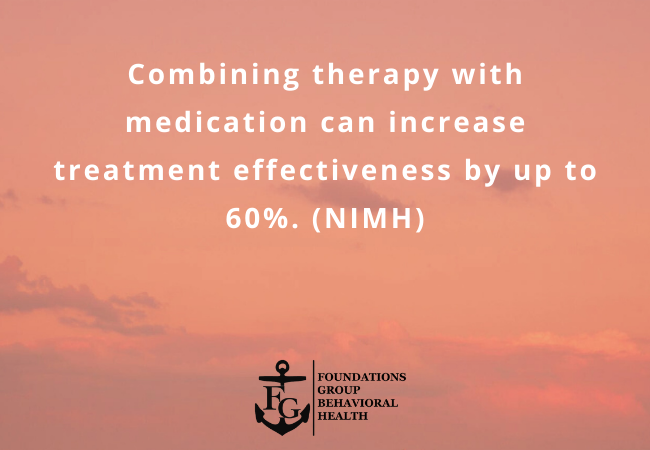Outpatient therapy plays a crucial role in modern mental health treatment. It offers the structure and support of professional care without requiring full-time hospitalization or residential services. Whether you’re dealing with anxiety, depression, trauma, or co-occurring disorders, outpatient therapy allows you to continue your daily routine while receiving the therapeutic interventions needed for long-term healing.
At Foundations Group Behavioral Health, our Outpatient Mental Health Therapy Massachusetts programs are carefully designed to meet the needs of individuals at various stages of recovery. We offer a wide range of therapy modalities tailored to support clients in achieving mental, emotional, and behavioral wellness — all within the comfort and flexibility of an outpatient environment.
In this comprehensive guide, we’ll walk through the most common types of therapy available in outpatient settings, how they work, and who they benefit most. Whether you’re new to therapy or considering stepping down from a higher level of care like our Psychiatric Day Treatment Massachusetts, this information will help you make informed decisions about your treatment journey.
What Is Outpatient Therapy?
Outpatient therapy refers to mental health services delivered on a scheduled basis (typically once to several times per week) while clients continue to live at home and participate in daily life. It is ideal for individuals with mild to moderate symptoms, or as a step-down following more intensive treatment.
Outpatient therapy may be delivered in various formats, including:
- Individual therapy
- Group therapy
- Family counseling
- Medication management
- Skill-building and psychoeducation workshops
These services are often included within broader Mental Health Treatment Programs Massachusetts, which provide coordinated, multidisciplinary care.
1. Cognitive Behavioral Therapy (CBT)
Overview:
Cognitive Behavioral Therapy is one of the most researched and widely used therapies for treating mood and anxiety disorders. CBT focuses on identifying and modifying negative thought patterns that influence emotions and behaviors.
Common Applications in Outpatient Settings:
- Generalized anxiety disorder
- Major depressive disorder
- Panic disorder
- OCD and phobias
- Co-occurring addiction and mood symptoms
How CBT Works:
In CBT sessions, clients work with a therapist to:
- Recognize distorted thinking
- Replace negative thoughts with healthier alternatives
- Learn coping skills to respond to stress and emotional triggers
- Set behavioral goals and track progress
Best Fit For:
Clients in our Anxiety Treatment Program Massachusetts and Depressive Disorder Treatment Program Massachusetts benefit immensely from CBT as part of their outpatient plan.
2. Dialectical Behavior Therapy (DBT)
Overview:
Originally developed for borderline personality disorder, DBT is now widely used for emotional dysregulation, suicidal ideation, and self-harming behaviors. It combines traditional CBT techniques with mindfulness and acceptance strategies.
Core DBT Skills Include:
- Distress Tolerance: Navigating emotional crises without harmful behavior
- Emotional Regulation: Understanding and managing intense emotions
- Interpersonal Effectiveness: Building healthy relationships and boundaries
- Mindfulness: Fostering present-moment awareness
How DBT Is Delivered in Outpatient Settings:
- Weekly individual therapy
- Group skills training
- Optional phone coaching
- Homework to reinforce techniques
Best Fit For:
Clients in our Trauma Disorder Treatment Program Massachusetts and Half Day Treatment Program Massachusetts often benefit from DBT’s structured and skills-based approach.
3. Trauma-Focused Therapy
Overview:
For individuals with a history of abuse, neglect, violence, or other traumatic experiences, traditional talk therapy may not be enough. Trauma-focused therapy is designed specifically to help survivors process traumatic memories and reduce their impact.
Key Modalities Include:
- EMDR (Eye Movement Desensitization and Reprocessing)
- Cognitive Processing Therapy (CPT)
- Prolonged Exposure Therapy
- Narrative Therapy
Goals of Trauma-Focused Therapy:
- Reduce emotional reactivity to traumatic memories
- Reframe negative beliefs (“I’m not safe,” “It’s my fault”)
- Learn grounding and coping strategies
Best Fit For:
Ideal for clients in our Trauma Disorder Treatment Program Massachusetts and Psychiatric Day Treatment Massachusetts who need a safe, structured space to work through past trauma.
4. Mindfulness-Based Cognitive Therapy (MBCT)
Overview:
MBCT blends principles of mindfulness meditation with cognitive behavioral techniques. It is especially effective for individuals with recurrent depression or anxiety.
MBCT Techniques Taught in Outpatient Settings:
- Breathwork and body scans
- Mindful movement
- Awareness of automatic thought patterns
- Present-moment focus
Benefits:
- Reduces rumination and catastrophic thinking
- Improves emotional regulation
- Promotes long-term mental resilience
Best Fit For:
Clients in Outpatient Mental Health Therapy Massachusetts who want to combine talk therapy with somatic and awareness-based techniques.
5. Psychodynamic Therapy
Overview:
Rooted in Freudian theory, psychodynamic therapy helps clients explore unconscious motivations, unresolved conflicts, and long-standing relational patterns.
Key Elements:
- Free association
- Dream analysis
- Transference and countertransference
- Interpretation of core conflicts
Goal:
To bring insight into behavior and improve interpersonal functioning.
Best Fit For:
Clients seeking deeper emotional insight and long-term change, especially those in extended Mental Health Therapy Massachusetts.
6. Group Therapy
Overview:
Group therapy offers peer support, accountability, and a sense of shared experience. It is an essential component of many outpatient programs, including Half Day Treatment Program Massachusetts and Intensive Outpatient tracks.
Types of Group Therapy Offered:
- Skills groups (CBT, DBT, mindfulness)
- Process groups (exploring emotions and relationships)
- Psychoeducation groups (learning about diagnoses, medication, stress)
Benefits:
- Reduces isolation
- Builds social skills
- Encourages honest feedback
- Provides real-world practice of coping skills
Best Fit For:
Group therapy is beneficial across all levels of care, especially for clients in our Anxiety, Depressive, or Trauma Disorder Treatment Programs Massachusetts.

7. Family Therapy
Overview:
Mental illness doesn’t just affect the individual — it impacts the entire family system. Family therapy helps loved ones understand the condition, communicate more effectively, and support recovery.
Common Issues Addressed:
- Family conflict
- Co-dependency
- Enabling behaviors
- Parenting challenges
Best Fit For:
Families of clients in Psychiatric Day Treatment Massachusetts and transitional programs where communication and home support are key to recovery success.
8. Psychoeducation and Life Skills Coaching
Overview:
Often delivered in outpatient programs as workshops or structured classes, psychoeducation helps clients learn more about their condition, treatment options, and self-care strategies.
Topics May Include:
- Understanding anxiety and depression
- Medication management
- Nutrition and mental health
- Conflict resolution
- Financial and job-readiness skills
Best Fit For:
Clients in Half Day Treatment Program Massachusetts or stepping down from Psychiatric Day Treatment Massachusetts who are preparing for independent living or work reintegration.
Which Therapy Is Right for You?
The ideal therapy depends on several personal factors:
- Your diagnosis
- Severity and duration of symptoms
- History of trauma or substance use
- Level of support at home
- Previous treatment history
At Foundations Group Behavioral Health, we offer a detailed initial assessment to help match each client with the best combination of therapies, supports, and service intensity.
Why Choose Foundations Group Behavioral Health
When you’re seeking mental health treatment, choosing the right provider can make all the difference. At Foundations Group Behavioral Health, we understand that healing looks different for everyone — and so does therapy. That’s why we offer personalized, evidence-based outpatient care designed to meet you exactly where you are.
Here’s why individuals and families across Massachusetts trust us with their mental health:
1. Comprehensive Therapy Options — All in One Place
From Cognitive Behavioral Therapy (CBT) and Dialectical Behavior Therapy (DBT) to EMDR and Mindfulness-Based Therapy, our outpatient services are grounded in clinically proven methods that support meaningful change. Whether you’re addressing anxiety, depression, trauma, or co-occurring disorders, you’ll receive the right blend of therapies — tailored just for you.
2. Full Continuum of Care, Seamlessly Connected
We provide more than just outpatient therapy. Our programs include Half Day Treatment, Intensive Outpatient Programs, and Psychiatric Day Treatment Massachusetts, allowing you to move between levels of care without losing momentum. Every transition is coordinated and supported, so you never have to start over.
3. Specialized Programs for Focused Healing
Struggling with trauma? Overwhelmed by anxiety? Battling depression? Our targeted programs — including the Anxiety Treatment Program Massachusetts, Depressive Disorder Treatment Program Massachusetts, and Trauma Disorder Treatment Program Massachusetts — ensure your treatment plan is focused, effective, and aligned with your specific needs.
4. Compassionate Experts Who Truly Listen
Our team includes experienced psychiatrists, licensed therapists, and behavioral health specialists who lead with empathy, respect, and deep clinical insight. You’re not just a patient here — you’re a partner in your care.
5. Flexible Scheduling for Real Life
We know that life doesn’t stop when you start therapy. That’s why we offer flexible outpatient sessions that fit around your work, school, and family responsibilities. Whether you’re seeking weekly therapy or a more intensive outpatient plan, we make it work for your schedule.
Conclusion
Outpatient therapy offers the flexibility, support, and evidence-based care needed to make meaningful progress in mental health recovery. Whether you’re beginning your healing journey or stepping down from a higher level of care, the diverse therapy options available at Foundations Group Behavioral Health ensure that your treatment is as unique as you are.
We’re here to help — with compassionate professionals, personalized plans, and proven strategies across our full continuum of services. Ready to take the next step? Call us at 888.685.9730 and let’s build a treatment plan that works for you.
FAQ on Outpatient Therapy
What is outpatient therapy, and how does it work?
Outpatient therapy allows individuals to receive mental health care while continuing to live at home. Clients attend scheduled therapy sessions and may participate in group, individual, or family counseling. Our Outpatient Mental Health Therapy Massachusetts program offers personalized, flexible care.
What conditions can outpatient therapy treat?
Outpatient therapy is effective for a range of conditions, including anxiety, depression, PTSD, and co-occurring disorders. At Foundations Group Behavioral Health, we tailor therapy through specialized programs like the Anxiety Treatment Program Massachusetts and Trauma Disorder Treatment Program Massachusetts.
What types of therapy are most common in outpatient settings?
Common outpatient therapies include:
- Cognitive Behavioral Therapy (CBT)
- Dialectical Behavior Therapy (DBT)
- Mindfulness-Based Cognitive Therapy (MBCT)
- Psychodynamic therapy
- Group and family therapy
- Trauma-focused therapy, such as EMDR
Can I receive trauma-focused therapy in outpatient care?
Yes. Our Trauma Disorder Treatment Program Massachusetts offers EMDR, CPT, and other evidence-based approaches to help clients heal from past trauma while continuing to live independently.
How often will I need to attend sessions?
Most outpatient clients attend therapy 1–3 times per week. Those in more structured programs like our Half Day Treatment Program Massachusetts may participate several hours a day, multiple days a week.
Does outpatient therapy include medication management?
Yes. Our integrated care model provides medication evaluation and monitoring, especially for clients in Psychiatric Day Treatment Massachusetts and Depressive Disorder Treatment Program Massachusetts.








